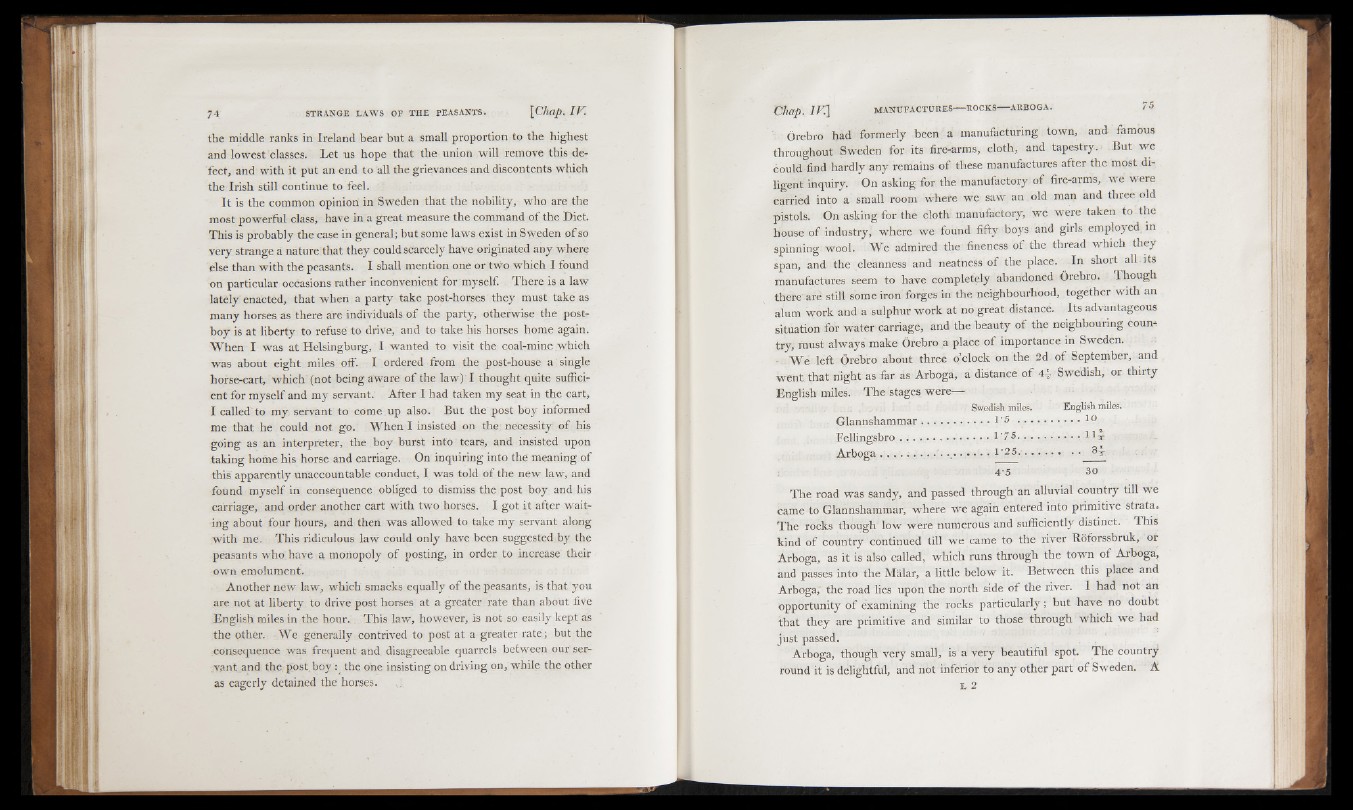
the middle ranks in Ireland bear but a small proportion to the highest
and lowest classes. Let us hope that the union will remove this defect,
and with it put an end to all the grievances and discontents which
the Irish still continue to feel.
It is the common opinion in Sweden that the nobility, who are the
most powerful class, have in a great measure the command of the Diet.
This is probably the case in general; but some laws exist in Sweden of so
very strange a nature that they could scarcely have originated any where
else than with the peasants. I shall mention one or two which I found
on particular occasions rather inconvenient for myself. There is a law
lately enacted, that when a party take post-horses they must take as
many horses as there are individuals of the party, otherwise the postboy
is at liberty to refuse to drive, and to take his horses home again.
When I was at Helsingburg,' I wanted to visit the coal-mine Which
was about eight miles off. I ordered from the post-house a single
horse-cart, which (not being aware of the law) I thought quite sufficient
for myself and my servant. After I had taken my seat in the cart,
I called to my servant to come up also. But the post boy informed
me that he could hot go. When I insisted on the necessity of his
going as an interpreter, the boy burst into tears, and insisted upon
taking home his horse and carriage. On inquiring into the meaning of
this apparently unaccountable conduct, I was told of the new law, and
found myself in consequence obliged to dismiss the post boy and his
carriage, and order another cart with two horses. I got it after waiting
about four hours, and then was allowed to take my servant along
with me. This ridiculous law could only have been suggested by the
peasants who have a monopoly of posting, in order to increase their
own emolument.
Another new law, which smacks equally of the peasants, is that you
are not at liberty to drive post horses at a greater rate than about five
English miles in the hour. This law, however, is not so easily kept as
the other. We generally contrived to post at a greater rate; but the
.consequence was frequent and. disagreeable quarrels between our servant
and the post, boy : the one insisting on driving on, while the other
as eagerly detained the horses.
Örebro had formerly been a manufacturing town, and famous
throughout Sweden for its fire-arms, cloth, and tapestry. But we
could find hardly any remains o f these manufactures after the most diligent
inquiry. On asking- for the manufactory of fire-arms, we were
carried into a small room where we saw an old man and three old
pistols. On asking for the cloth manufactory, we were taken to the
house of industry, where we found fifty boys and girls employed in
spinning, wooi. We admired the fineness of; the thread which they
span, and the cleanness and neatness of the place. In short all its
manufactures seem to have completely abandoned Örebro. Though
there are still some iron forges in the neighbourhood, together with an
alum work and a sulphur work at no great distance. Its advantageous
situation for water carriage, and the beauty of the neighbouring country,
must always make Örebro a place of importance in Sweden.
- W e left Örebro about three o’clock on the 2d of September, and
went, that night as far as Arboga, a distance of 4A Swedish, or thirty
English miles. The stages were—
. Swedish miles. English miles.
Glannshammar . . . . . . ... 1 0 .,
Fellingsbro........................ • • l"75. , . | jj l q
Arboga . . . . . . .... . . . • 1 "25.'. . . . . . . • 3x
4-5 30
The road was sandy, and passed through an alluvial country till we
came to Glannshammar, where we again entered into primitive strata.
The rocks though low were numerous and sufficiently distinct. This
kind of country continued till we came to the river Roforssbruk, or
Arboga, as it is also called, which runs through the town of Arboga,
and passes into the Malar, a little below it. Between this place and
Arboga," the road lies upon the north side o f the river. I had not an
opportunity of examining the rocks particularly; but have no doubt
that they are primitive and similar to those through which we had
just passed.
Arboga, though very small, is a very beautiful spot. The country
round it is delightful, and not inferior to any other part of Sweden. A
L 2